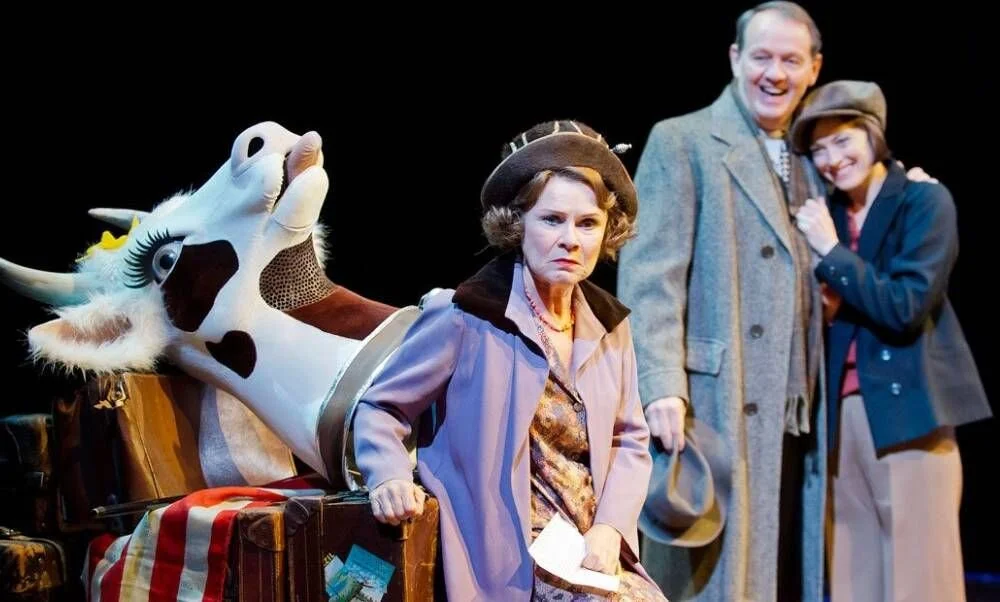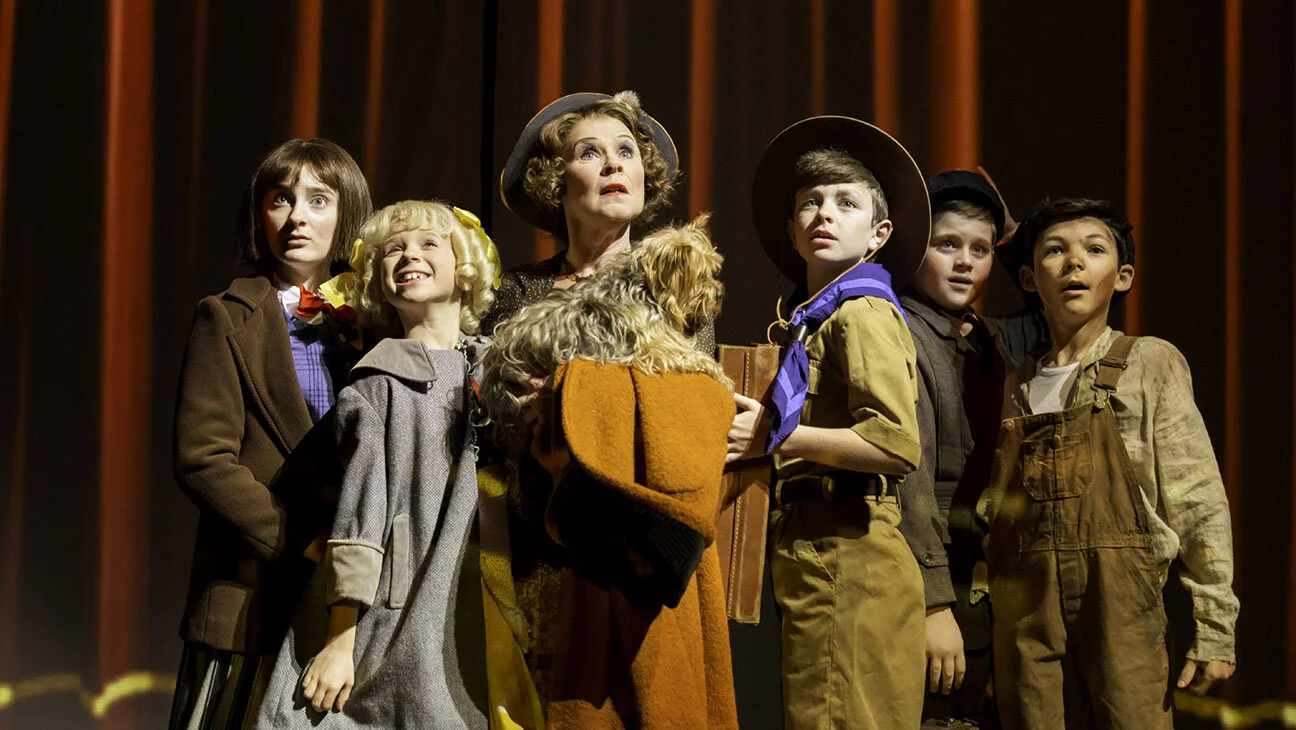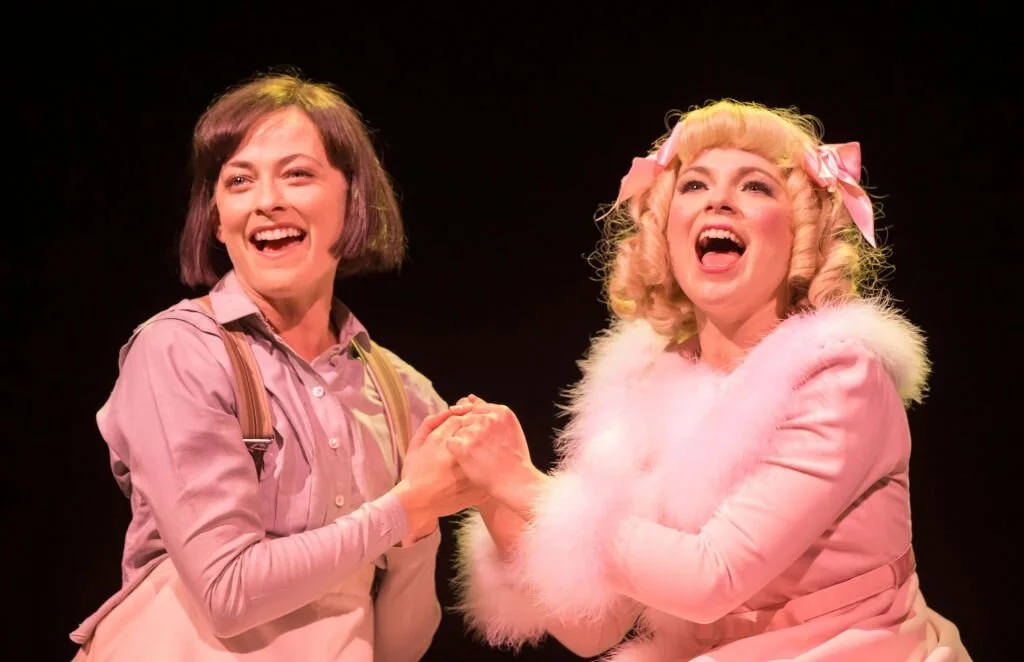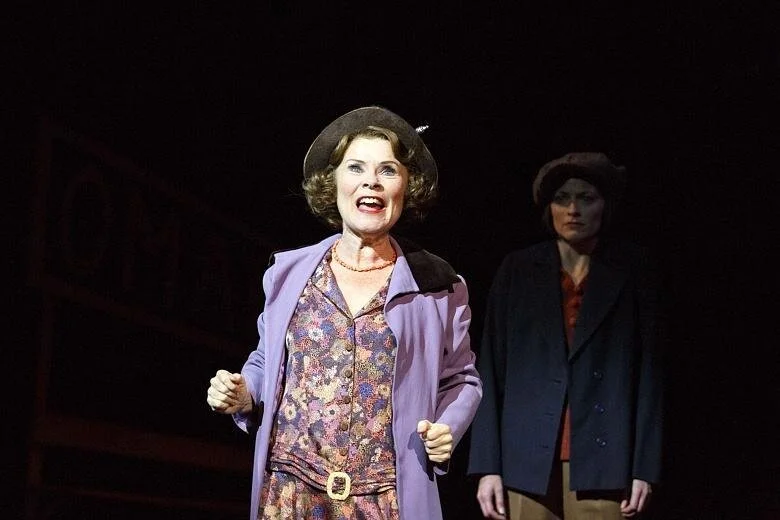Gypsy, or The Gayest Way to Enjoy Female Burlesque
From Left to Right: A Disembodied Cow Head, Imelda Staunton, Peter Davison, and Lara Pulver in Gypsy at the Savoy Theatre.
Disclaimer: Mild Spoilers for a 60-Year-Old Musical Ahead
I am gay, and I love Stephen Sondheim. Let me rephrase that. I am gay, therefore I love Stephen Sondheim. It’s a cause and effect relationship.
It’s a dynamic much like (seamless transition) the fictionalized relationship of the overbearing Mama Rose and her daughter, the famed burlesque artist Gypsy Rose Lee, in Styne & Sondheim’s Gypsy.
Gypsy first appeared on my radar shortly after I made the irrational and deeply self-destructive decision to try to familiarize myself with every musical Stephen Sondheim ever had a hand in creating.
Work from home has been slow lately, okay?
Gypsy (to which Sondheim contributed the lyrics), seemed like the perfect choice to kick things off, as it’s an American musical theatre mainstay that I surprisingly had no exposure to, and so it wound its way onto a list of streamable staged musicals available for me to rent online (RENT is also available to rent).
I recently sat down with a few friends one Saturday night, pre-saved the soundtrack on Spotify, and hit play.
Imelda Staunton as “Mama Rose,” and her band of vaudeville performers.
In Gypsy (occasionally subtitled “A Musical Fable”) we follow the ultimate show business mother Mama Rose and her band of child vaudeville performers, the reluctant headliners of which are Rose’s own daughters, June and Louise. Like a car crash, we’re unable to look away as we watch Rose drag her offspring over broken glass and nails towards a fading dream of stardom, unaware that only one is truly destined for celebrity, and not in the way Rose intends.
Over the course of the show, as June and Louise grow into adulthood, we watch Rose become the cause of stardom, her fatally shy daughter Louise become the affected party, and Louise’s subsequent burlesque persona Gypsy Rose Lee manifest as the resulting celebrity. This persona, dripping with the confidence and fineries her previous self never possessed, is the result of decades of Rose’s abusive, controlling parenting, or what Jewish mothers refer to as...parenting.
If you’re reading this, I’m just kidding Mom. If you’re not reading this, why not? Seems that like Louise before me, I’m also doomed to channel your neglect into a burlesque persona of increasing fame and notoriety, and it’s all your fault.
Luckily, I’m actually not like Louise (and don’t have the body for burlesque). However, in watching the filmed production from London’s West End, I still found myself surprisingly drawn towards Lara Pulver’s (Sherlock, True Blood) portrayal of the fabled Queen of the Strip Tease, more-so than any other character on stage.
Lara Pulver as “Gypsy Rose Lee” performs “The Strip.”
True to word-of-mouth reviews I had heard about the production previously, Imelda Staunton (Shakespeare in Love, Harry Potter) takes an electrifying turn as Rose, leaving a trail of gnawed-on furniture in her wake, and ultimately has the last word on stage. But, it’s also Louise’s 11 o’clock number, aptly and yet deceivingly called “The Strip,” that has kept my brain hyper fixated on this musical weeks after my first viewing.
Why do I say “deceivingly?” After all, “The Strip” is a nearly 7-minute-long sequence in which we watch Louise transform from a deer-in-the-headlights novice to a famed burlesque headliner over the course of four different strip routines. Seems like they named it right? Right? Wrong.
Though on Broadway, this sequence was originally titled “Let Me Entertain You,” the reason I say “The Strip” is deceiving is because this new title, which was utilized by the two most recent productions (both the West End revival and the Broadway revival), deliberately ignores the song’s core musical motif; a motif which is actually borrowed from an earlier section of the show. “The Strip,” is not a new song, but rather an extended reprise of this earlier musical motif, lifted from the refrain of “Let Me Entertain You,” sung by child-versions of Louise and June, and often repeated throughout Gypsy’s first act.
Under a traditional musical theatre sensibility, “The Strip” therefore should be entitled “Let Me Entertain You (Reprise),” but in leaving this reprise a surprise (don’t try to say that phrase too fast) this sequence effectively turns the entirety of the show and our own expectations on its head. Here comes the hyper fixation.
Lara Pulver as “Louise,” and Gemma Sutton as “June”
For anyone familiar with Sondheim or Styne’s previous work, this concept of surprising the audience with a reprise of an earlier musical motif is...well, not surprising, actually. Both composers are masters of setting the same lyrics to a different key, economically and subversively illuminating new depth and meaning to the same words (“A Beautiful Reflection,” in Styne’s Funny Girl; “The Witch’s Lament/Children Will Listen” in Sondheim’s Into the Woods).
“Let Me Stripertain You,” which is my pitch for retitling this sequence*, is the ultimate example of what this musical theatre writing tool can do. The song’s lyrics, (“Let me entertain you, let me make you smile.”) read hyper-sexualized, and laden with innuendo when set to a strip tease, as opposed to merely providing the rhythm for a child’s vaudeville routine, as in its earlier incarnation in the show.
Combine that with Pulver’s nuanced, thoughtful performance, in which she subtly becomes more confident and enticing with each strip routine in the sequence, and we’re left with a song that nearly dwarfs the show’s more famous showstopper “Rose’s Turn.” And, as someone who has watched every single “Who Sang the Climax of Rose’s Turn Best?” video available on YouTube (Patti LuPone all the way), I was ultimately expecting that moment to be the undeniable climax of the show. And, in many ways, it still is! But, it’s not what surprised me the most. And, for me, that element of surprise and subversion is what takes a musical like Gypsy from good to great; and then to transcendent.
Imelda Staunton performs “Everything’s Coming Up Roses.”
As a longtime Sondheim fan, discovering Gypsy for the first time provided me with that rare experience of watching something that felt familiar, as it belongs to a canon I’m relatively well-versed in, while also having my expectations completely subverted, and my appreciation for Sondheim and Styne’s respective bodies of work accentuated. For those of us who are desperately missing live theatre, Gypsy, performed live from the Savoy Theatre, is an excellent substitute for a night out, and I’m sure the cocktails are a lot cheaper in your own house.
Gypsy is available to rent on Amazon, or for free at my house if you want to come over and watch it with me, I’m free whenever.
*Editor’s Note: Shortly after suggesting retitling the “The Strip,” to “Let Me Stripertain You,” lawyers from the Sondheim estate entered Jack’s home and tazed him with a cattle prod. He regrets this suggestion, and has since apologized to the families.




